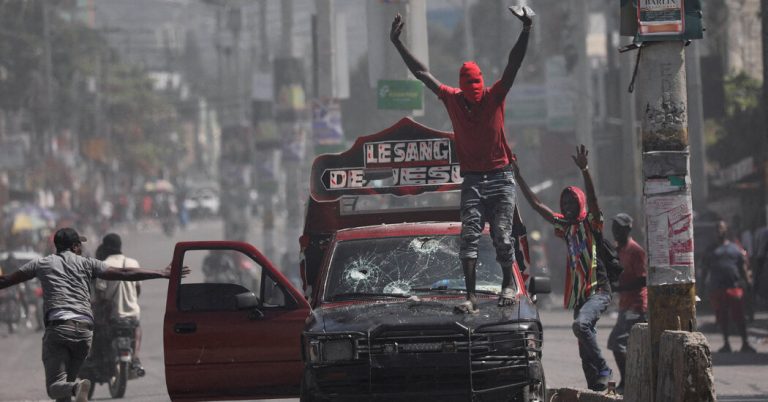Gangs attacked Haiti’s largest prison and allowed inmates to escape Saturday night, according to local police unions and a lawyer for some of the inmates, the latest in escalating violence and unrest in the country’s capital, which has been devastated by gang violence for more than two years.
While details of the attack remained unclear, at least two of the country’s police unions took to social media on Saturday to call on all officers to report to the national penitentiary in Port-au-Prince, the capital, to help control the situation and prevent the prisoners from escaping.
“If we let the gangs take over the penitentiary, we’re done,” the national police union SNPH-17 said in a post on X. “No one will be spared in the capital.”
Haiti’s national penitentiary – with nearly 4,000 inmates, although it was built to hold only 800 – has several high-profile inmates, including Colombian commandos accused of being part of the team that killed Haitian President Jovenel Moïse in 2021.
A Haitian lawyer for several of the soldiers accused of the killing, Samuel Madistin, told The New York Times that he had spoken with clients who said the national penitentiary was nearly empty of prisoners. Only those who were too old or infirm to flee and those charged with Moise’s murder remained, Mr. Madistin said, for fear of being hunted down if they left prison.
Videos released on social media on Sunday appeared to show journalists wandering around parts of the national penitentiary, mostly empty of inmates.
Lionel Lazarre, coordinator of the National Union of Haitian Police, told The Times that the penitentiary and a second prison in Port-au-Prince, the Croix-des-Bouquets Civil Prison, were both attacked on Saturday and that some inmates had escape. , but it was unclear how many.
Mr Lazarre added that heavy gunfire had broken out inside the prison, but that by Sunday police had regained control.
“The attack was obvious,” Mr Lazar said, adding that the gang members had made no attempt to hide their plans to close the penitentiary. “There is a lack of care from the police authorities who did not take these messages seriously or did not take enough measures to enhance security.”
Commissioner Ernst Dorfeuille, senior police officer in charge of operations in Port-au-Prince, said the Internet was down, so it was difficult to get an assessment of the situation. However, he thought most of the prisoners had escaped: “I don’t think there’s any inmates left down there,” he said, adding, “The gangs got together and the attack force was in their favor.”
The Haitian government has not commented on the episode.
Haiti has been plunged into a state of extreme turmoil since Mr. Moïse’s assassination that led to widespread gang violence and a near-total collapse of security. Out of a force of about 15,000 officers, nearly 3,000 officers have left their posts in the past two years, according to police figures.
The country has no president or other elected national officials, and gangs – which have taken over much of Port-au-Prince – terrorize thousands of people every day. Last year at least 5,000 people were killed in Haiti, according to the United Nations.
Violence in the country escalated last week after Prime Minister Ariel Henry traveled to Kenya to finalize a deal that would see the country send 1,000 police to help restore order in Haiti.
The prison attack is part of a wave of attacks by armed gangs in recent days while Haiti’s prime minister is out of the country. The goal, according to Jimmy Chérizier, a gang leader known as Barbecue, is to overthrow what’s left of the government.
In a video message on Thursday, Mr. Cherizier said: “With our weapons and with the Haitian people, we will liberate the country.”
It is unclear whether an international police force led by Kenya, which has been criticized by human rights groups, could help control the violence. The recent attacks are a clear show of strength in the gang-ravaged nation, experts say.
“The gangs seem to be sending a message of intimidation to the troops that may soon be deployed in Haiti, saying, ‘Well, we’re forming a united front and we can strike at the same time,'” said Diego Da Rin, a Haiti expert. International Crisis Group.
Romain Le Cour, a security analyst at the Global Initiative against Transnational Organized Crime, said, “it’s frankly a situation where you have a complete absence and silence of the state,” adding that some of the violence had likely been planned for weeks, while some was spontaneous. .
Although the authorities in Haiti have been losing ground for years, Mr. Le Cour said, the past few days have shown that armed gangs have achieved a “critical shift” in the balance of power.
“It’s probably one of the first times you’ve had these directed, targeted attacks. It’s not like before,” he added. “Now they just do.”
Andre Poltre reported from Port-au-Prince, Emiliano Rodríguez Mega from Mexico City and David C. Adams from Miami.




